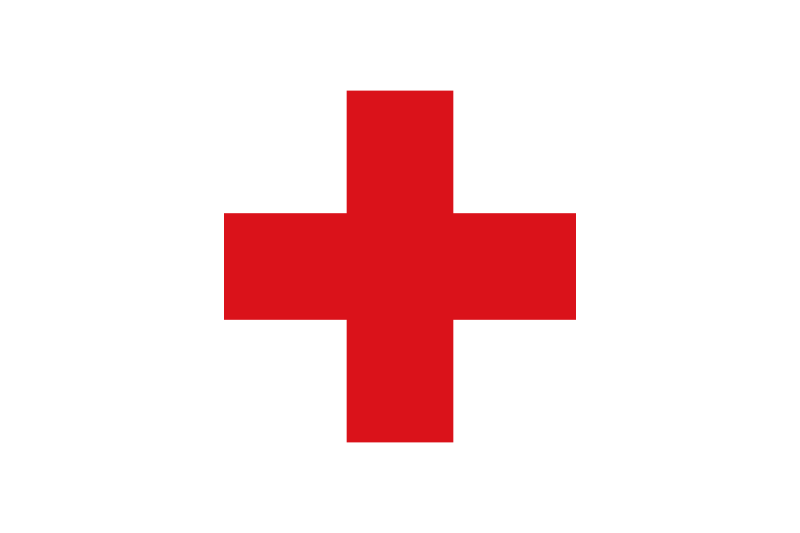Nepal Red Cross is a nongovernmental organization of Nepal. It is an aid agency and is chiefly associated with distributing humanitarian aids which are emergency relief efforts, for instance in response to the natural disasters like flood, earthquake, etc. Nepal Red Cross Society was founded in 1963. It was recognized by the International Committee of Red Cross (ICRC) in 1964 which is the world’s largest humanitarian organization. In the same year in 1964, it was also affiliated to International Federation of Red Cross and Red Crescent Societies.
Table of Contents
Just like ICRC being the largest humanitarian organization in the world, Nepal Red Cross Society has also grown to be the largest humanitarian organization in Nepal over the years. Its network is spread throughout Nepal. It provides its services through the district chapters which are present in each district in Nepal. District Chapters which are extended in all 75 districts of Nepal receives organizational support from more than 800 sub chapters and district committees under them. The activities of Nepal Red Cross also include the volunteer works which are done by youths and students. They have their own groups and activities conducted through the Nepal Junior and Youth Red Cross Circles at schools, communities and campuses. The headquarters of Nepal Red Cross Society lies in Kathmandu, Nepal.
The chief core principles of NCRS are humanity, impartiality, neutrality, independence, voluntary service, unity and universality. Following these principles to carry out all of their activities, NCRS has become the largest humanitarian aid agency that is trusted by all countrymen. NCRS is committed to provide assistance and support to the people who are suffering without any discrimination, is autonomous and their relief movement is voluntary.
Regarding the humanitarian support it provides in the country, Nepal Red Cross Society provides its support mainly in the areas of disaster management, health care, promotion of fundamental principles and humanitarian values and organizational development.
The geographical setting of Nepal makes many of its areas prone to natural disasters. Earthquakes have been occurring at frequent intervals of time. Similarly, there have been cases of floods, landslides and droughts frequently. To the response of such disasters, NCRS has always been active since its inception. It is one of the key actors in dealing with the disasters. Now, NCRS is involved in various areas of disaster management like disaster preparedness and reduction, disaster relief and management of the displaced population during the disaster. Depending upon the severity of the disaster, NCRS makes its organizations and volunteers at the appropriate levels active and involved in the disaster management. They have skilled human resources and the data collected by NCRS during the disaster is considered to be a credible one by many other organizations.
Health services are also main areas of support by NCRS. Blood transfusion services are one of the most significant services provided by NCRS. It regulates blood transfusion services throughout the country. 58 blood transfusion services in 41 districts are functional. Ambulance services are also one of its vital services. The other health services of NCRS include promotion of hygiene and sanitation, generation of awareness on immunization, nutrition, family planning, infectious diseases and first aid skills.
NCRS is involved in the organizational development and promotion of its principles and humanitarian values. For the promotion of its values and principles, there is a communication department. The communication department performs the functions like networking, management of the website, radio programme, publication of NCRS annual report, etc. It runs various projects for each of its areas of activities.
You can also become a member or volunteer of Nepal Red Cross Society and get yourself involved with its humanitarian activities. For more information of NCRS, you can visit their official website, www.ncrs.org.
Nepal Red Cross Society
Nepal Red Cross Society was founded in 1963. However, later in 1964, it was recognized by ICRC and affiliated with an International Federation of Red Cross Red Crescent Society in the same year. Over the past year, it has grown as one of the largest humanitarian organization in Nepal. It has its network in all the 75 districts of Nepal. Many youths and the students have been contributing to Nepal Red Cross Society as volunteers.

Nepal Red Cross Society has following basic principles:
Humanity
The International Red Cross and Red Crescent Movement works to prevent and relieve human suffering. It was founded out of a need to provide assistance, without prejudice, to those who were injured on the battlefield. Its goals are to uphold respect for people and to safeguard life and health. It encourages all peoples to understand one another, get along, cooperate, and maintain a lasting peace.
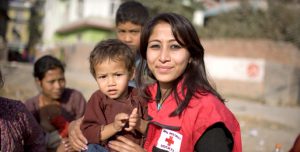
image via www.nrcs.org.np
Impartiality
Nepal Red do not make distinction made based on nationality, race, religion, social class, or political views. It works to ease people’s suffering by prioritizing the most urgent cases of distress and acting completely in the best interests of people.
Neutrality
Red Cross do not choose sides in conflicts or participate at any moment in conflicts of a political, racial, religious, or ideological nature in order to maintain the confidence of all.
Independence
The organization is fully independent. The National Societies must always maintain their autonomy so they can always operate in harmony with the ideas of the Organization, even while they are adjunct in the humanitarian services of their governments and subject to the laws of their respective countries.
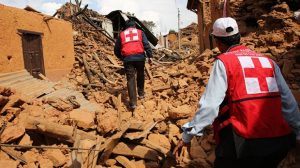
image via www.nrcs.org.np
Voluntary service
To provide voluntary service without any desire to gain.
Unity
In any nation, there can only be one Red Cross or Red Crescent Society. All must have access to it. It must continue to provide aid across its whole region.
Universality
The International Red Cross and Red Crescent Movement is a global organisation where all Societies have an equal standing and are equally responsible for aiding each other.
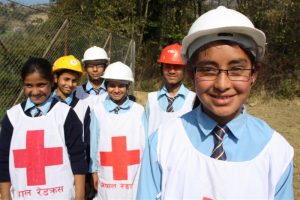
image via www.nrcs.org.np
Vision of Red Cross Nepal
To conduct an efficient, self-sustainable and independent humanitarian organization committed to provide a quick relief to human sufferings and reduce the risk to low level in a democratic, transparent and participatory way.
Mission:
To relieve human suffering and to reduce the risk of life through community participation and mobilization of volunteers, by expanding and strengthening the organizational structure of the society and by building links with governmental and non-governmental organizations.
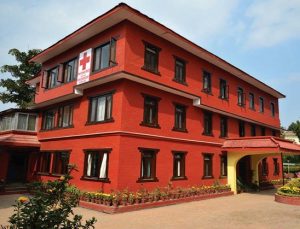
image via www.nrcs.org.np
Objectives and Functions
- To serve war-victims, both civilians and army personnel, in times of armed conflict, and to work in the fields identified by the Geneva Conventions, including Tracing, in times of peace.
- To contribute to promoting and improving health condition, preventing of diseases and reducing suffering.
- To arrange for emergency relief services for disaster victims.
- To organize Junior and Youth Red Cross as an integral part of Nepal Red Cross Society and to conduct activities promoting their participation.
- To promote the Fundamental Principles of the Red Cross Movement and International Humanitarian Law with the objective of developing humanitarian ideals.
- To ensure respect for the International Humanitarian Law and protection of the Red Cross Emblem.
- To perform other functions of community development and public welfare.
Nepal Red Cross Society does the following works:
- Disaster management
- Healthcare
- Promotion of FP and HV
- Organizational development
Management committee of Nepal Red Cross
Chairman, Prof. Sudarshan Prasad Nepal
Vice-Chairman, Mr. Bishnu Raj Nepal
Vice-Chairman, Ms. Radha Nepali
Secretary General, Mr. Bhupatilal Shrestha
Treasurer General, Mr. Kirshna Gopal Lageju
Deputy Secretary General, Mr. Manoj Kumar Thapa
Deputy Treasurer General, Ms. Bhagawati Sharma
Member, Ms. Hira Devi Sharma
Member, Ms. Luna Subedi Dhungana
Member, Mr. Mahendra Shrestha
Member, Mr. Purna Prasad Poudel
Member, Mr. Uttam Joshi
Member, Mr. Binod Kumar Basnet
Member, Mr. Sanjeev Kumar Mallik
Member, Mr. Surya Chandra Neupane
Member, Mr. Basudev Gautam
Member, Mr. Guman Raj Pulami
Member, Mr. Yowan Prakash Shrestha
Member, Mr. Dol Raj Pandey
Member, Mr. Bir Bahadur Basnet
Member, Mr. Bal Bahadur Rawal
Member, Ms. Sheela Darji
Member, Ms. Babita Katuwal
Member, Mr. Muktinath Pokharel
Member, Mr. Ganesh Bahadur Mahat
Member, Ms. Indira Poudel
Member, Mr. Raj Deo Yadav
Member, Mr. Krishna Bahadur Ghaju
Member, Mr. Chandra Prasad Banjade
Member, Mr. Arun Khanal
Member, Mr. Krishna Bhakta Dangol
Member, Ms. Binita Adhikari
Member, Mr. Bekhaman Byanjankar

